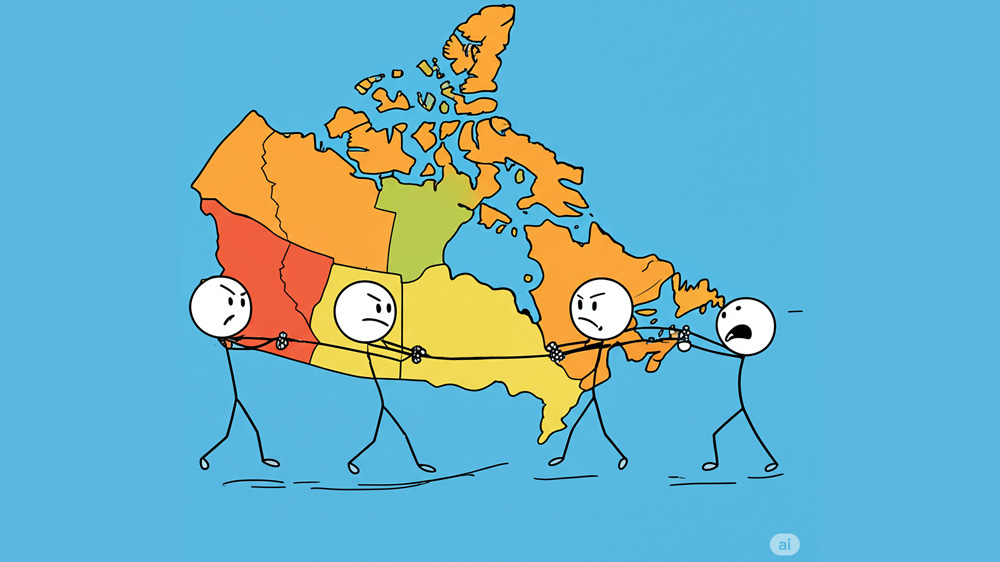In the trailing days of the 2025 Federal Election – a blast from the past appeared on the pages of the Globe and Mail – Preston Manning. Manning warned that a Liberal government returning to office would fan the flames of separation in Canada’s western provinces. Now that Manning’s warning went unheeded, provincial politicians have got their portable fans out to stoke that fire some more.
First and foremost regarding Preston Manning. He largely disappeared when the Conservative Party of Canada was founded by merging the Canadian Alliance and the Progressive Conservative parties. That was despite former PC leader Peter MacKay tap dancing over the agreement made with David Orchard saying the PCs would never merge. Never say never.
Manning left conservative political parties to found the Manning Centre for Building Democracy. His think-tank promoted conservative principles and acted as an advocacy group for right-leaning politicians. Think of the Fraser Institute with fewer reports and more conservatism. Manning retired from his centre in 2020 to spend more time with his family. Respectfully, he should focus on that. Stoking western alienation and separation does no one any good.
Western alienation does not just go back to the times of Trudeau the Elder and his National Energy Policy in the early 1980s. Western provinces have always had a disconnect from central Canada due to political ideology, clique-ism by the Laurentian elites on Parliament Hill, and the murky separation of powers between the federal and provincial governments. Like in Quebec, there has always been a minority that supported provinces like Alberta and Saskatchewan “going it alone” and separating from Canada. Quebec has managed to use its linguistic and cultural differences to successfully drive a wedge into politics, for which ruling parties must placate. Western Canada does not have as pronounced differences to use as that wedge. Enter Alberta Premier Danielle Smith.
Premier Smith has managed to get the bellows going, with a healthy dose of American-style rhetoric and Donald Trump coat-tail following. This taps into the same Maple-MAGA-like rhetoric as those involved with the trucker convoys in 2022. Similar groups aligned themselves with the federal Conservatives in the spirit of faux-patriotism.
Smith’s desire for a “new deal” for Alberta is however a shiny object – something for her province to look at over in one direction, diverting attention away from another issue.
In 2019, then-Premier Jason Kenney introduced the Alberta Surgical Initiative, for-profit surgical care that would bill the provincial healthcare system. This resulted in fees for hip, shoulder, and knee replacement surgeries to more than double in five years – creating a strain on that province’s health care system. In 2022, medical lab testing was contracted to private companies in that province. Three years later, both issues are causing Smith to be on the defence as there are requests to that province’s Auditor General and calls for a more formal inquiry. Smith has blamed the Alberta Health Service, who recently fired its CEO.
Western Separation for Smith is not so much of getting a new deal for Alberta – it is a diversion tactic – a shiny object – to get people to look away from the smoldering mess within her government’s health ministry.
Albertan premiers for decades have railed against the federal transfer payment system – rightly so in some cases. For years, some provincial governments have claimed balanced budgets while also receiving transfer payments from Alberta and other have-provinces. How Quebec is considered a have-not province with the billions in hydro-electric power available is also mystifying. But a transfer agreement, and lack of tidewater pipeline access for Alberta oil sands are not reasons to separate. Leaving the Canadian federation is not going to magically put a tidewater port on the province’s boundary.
In 2022, Alberta received $12.6 billion in transfers, mostly earmarked for health care, and sent to the federal government $14.2 billion – a $1.6 billion difference. Alberta’s strength financially comes from its oil sands, which has higher production costs than traditional oil well and shale oil development. Alberta is at a higher risk for economic instability based on the cost of oil. That risk directly impacts the province’s treasury. Outside of the confines of the federation, on its own, Alberta is at more risk of financial failure.
When it comes to the notion of separation, we’ve seen elsewhere in the world where a divided house falls. Instead of Manning, Smith, et al stoking the fans of division and separation, their energies should be better spent on fixing the house we already have. That, or in Manning’s case, return to that retirement he opted for. Shiny objects and bad ideas are not needed.






Well said.